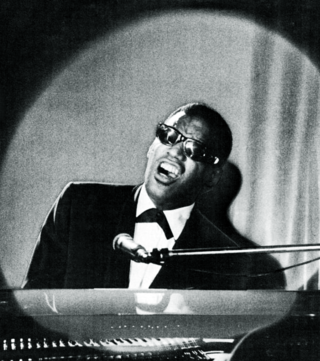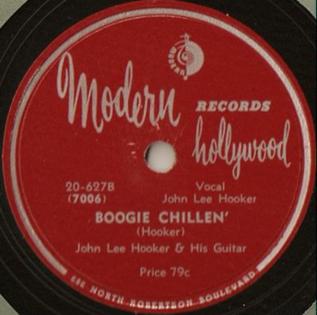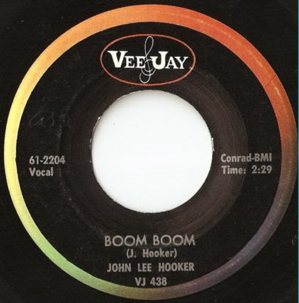Related Research Articles

John Lee Hooker was an American blues singer, songwriter, and guitarist. The son of a sharecropper, he rose to prominence performing an electric guitar-style adaptation of Delta blues that he developed in Detroit. Hooker often incorporated other elements, including talking blues and early North Mississippi hill country blues. He developed his own driving-rhythm boogie style, distinct from the 1930s–1940s piano-derived boogie-woogie. Hooker was ranked 35 in Rolling Stone's 2015 list of 100 greatest guitarists, and has been cited as one of the greatest male blues vocalists of all time.

Soul music is a popular music genre that originated in the African-American community throughout the United States in the late 1950s and early 1960s. It has its roots in African-American gospel music and rhythm and blues. Soul music became popular for dancing and listening, where U.S. record labels such as Motown, Atlantic and Stax were influential during the Civil Rights Movement. Soul also became popular around the world, directly influencing rock music and the music of Africa. It also had a resurgence in the mid-to late 1990s with the subgenre neo-soul, which added modern production elements and influence from hip-hop.

Doo-wop is a subgenre of rhythm and blues music that originated in African-American communities during the 1940s, mainly in the large cities of the United States, including New York, Philadelphia, Pittsburgh, Chicago, Baltimore, Newark, Detroit, Washington, D.C., and Los Angeles. It features vocal group harmony that carries an engaging melodic line to a simple beat with little or no instrumentation. Lyrics are simple, usually about love, sung by a lead vocal over background vocals, and often featuring, in the bridge, a melodramatically heartfelt recitative addressed to the beloved. Harmonic singing of nonsense syllables is a common characteristic of these songs. Gaining popularity in the 1950s, doo-wop was "artistically and commercially viable" until the early 1960s and continued to influence performers in other genres.

William Edward "Little Willie" John was an American R&B singer who performed in the 1950s and early 1960s. He is best known for his successes on the record charts, with songs such as "All Around the World" (1955), "Need Your Love So Bad" (1956), "Talk to Me, Talk to Me" (1958), "Leave My Kitten Alone" (1960), "Sleep" (1960), and his number-one R&B hit "Fever" (1956). An important figure in R&B music of the 1950s, he faded into obscurity in the 1960s and died while serving a prison sentence for manslaughter.

Chester Arthur Burnett, better known by his stage name Howlin' Wolf, was an American blues singer and guitarist. He was at the forefront of transforming acoustic Delta blues into electric Chicago blues, and over a four-decade career, recorded blues, rhythm and blues, rock and roll, and psychedelic rock. He is regarded as one of the most influential blues musicians of all time.
Blues rock is a fusion genre and form of rock music that relies on the chords/scales and instrumental improvisation of blues. It is mostly an electric ensemble-style music with instrumentation similar to electric blues and rock. From its beginnings in the early to mid-1960s, blues rock has gone through several stylistic shifts and along the way it inspired and influenced hard rock, Southern rock, and early heavy metal.

The Spinners are an American rhythm and blues vocal group that formed in Ferndale, Michigan, in 1954. They enjoyed a string of hit singles and albums during the 1960s and 1970s, particularly with producer Thom Bell. The group continues to tour, without any original members, after Henry Fambrough retired in 2023.

Five Live Yardbirds is the live debut album by the English rock band the Yardbirds. It features the group's interpretations of ten American blues and rhythm and blues songs, including their most popular live number, Howlin' Wolf's "Smokestack Lightning". The album contains some of the earliest recordings with guitarist Eric Clapton.

For Your Love is the first American album by the English rock band the Yardbirds. Released in June 1965, it contains new studio recordings along with previously released singles. The album features some of the earliest recordings by guitarists Eric Clapton and his replacement Jeff Beck.

Having a Rave Up with the Yardbirds, or simply Having a Rave Up, is the second American album by the English rock group the Yardbirds. It was released in November 1965, eight months after Jeff Beck replaced Eric Clapton on guitar. It includes songs with both guitarists and reflects the group's blues rock roots and their early experimentations with psychedelic and hard rock. The title refers to the driving "rave up" arrangement the band used in several of their songs.

Michael John "Cub" Koda was an American rock and roll musician, songwriter, and critic. Rolling Stone magazine considered him best known for writing the song "Smokin' in the Boys Room", recorded by his band Brownsville Station, which reached number 3 on the 1974 Billboard chart.

Barrett Strong Jr. was an American singer and songwriter known for his recording of "Money ", which was the first hit single for the Motown record label. He is also known for his songwriting work in association with producer Norman Whitfield; together, they penned such songs as "I Heard It Through the Grapevine", "War", "Just My Imagination ", and "Papa Was a Rollin' Stone".

"Your Cheatin' Heart" is a song written and recorded by country music singer-songwriter Hank Williams in 1952. It is regarded as one of country's most important standards. Williams was inspired to write the song while driving with his fiancée from Nashville, Tennessee, to Shreveport, Louisiana. After describing his first wife Audrey Sheppard as a "cheatin' heart", in minutes he dictated the lyrics to Billie Jean Jones. Produced by Fred Rose, Williams recorded the song at his last session at Castle Studio in Nashville, Tennessee, on September 23.

Brownsville Station is an American rock band from Michigan popular in the 1970s. Original members included Cub Koda (guitarist/vocalist), Mike Lutz (guitarist/vocalist), T.J. Cronley (drummer), and Tony Driggins (bassist/vocals). Later members included Henry "H-Bomb" Weck (drummer) and Bruce Nazarian (guitarist/vocalist).

Dave Marsh is an American music critic and radio talk show host. He was an early editor of Creem magazine, has written for various publications such as Newsday, The Village Voice, and Rolling Stone, and has published numerous books about music and musicians, mostly focused on rock music. He is also a committee member of the Rock and Roll Hall of Fame.

"Boogie Chillen'" or "Boogie Chillun" is a blues song first recorded by John Lee Hooker in 1948. It is a solo performance featuring Hooker's vocal, electric guitar, and rhythmic foot stomps. The lyrics are partly autobiographical and alternate between spoken and sung verses. The song was his debut record release and in 1949, it became the first "down-home" electric blues song to reach number one in the R&B records chart.

William Franklin Guest was an American R&B/soul singer best known as a member of Gladys Knight & the Pips along with his cousins Gladys Knight, Merald "Bubba" Knight and Edward Patten. Guest was a member of the group for its entire history, from 1952 to 1989. He is a multiple Grammy Award winner and was inducted to the Rock and Roll Hall of Fame with Gladys Knight & the Pips in 1996.

"Boom Boom" is a song written by American blues singer and guitarist John Lee Hooker and recorded October 26, 1961. Although it became a blues standard, music critic Charles Shaar Murray calls it "the greatest pop song he ever wrote". "Boom Boom" was both an American R&B and pop chart success in 1962 and a UK top-twenty hit in 1992.

Detroit, Michigan, is a major center in the United States for the creation and performance of music, and is best known for three developments: Motown, early punk rock, and techno.
The Iguanas were an American garage rock band formed in Ann Arbor, Michigan, in 1963. Beginning as a duo, the group is best-remembered as the launching pad for the musical career of influential punk rock artist Iggy Pop. The band was one of the most popular acts in Michigan during 1965, and recorded one single, a cover version of Bo Diddley's "Mona", along with additional material later released on compilation albums.
References
- 1 2 3 4 5 Koda, Cub. "Out of This World". AllMusic. Retrieved 2022-06-29.
- ↑ Marsh, Dave (1999). The Heart of Rock & Soul: The 1001 Greatest Singles Ever Made (1st ed.). New York: Da Capo Press. p. 594. ISBN 978-0-306-80901-9.
- ↑ Carson, David A. (2006). Grit, Noise, & Revolution: The Birth of Detroit Rock 'n' Roll. Ann Arbor: University of Michigan Press. p. 55. ISBN 978-0-472-03190-0.